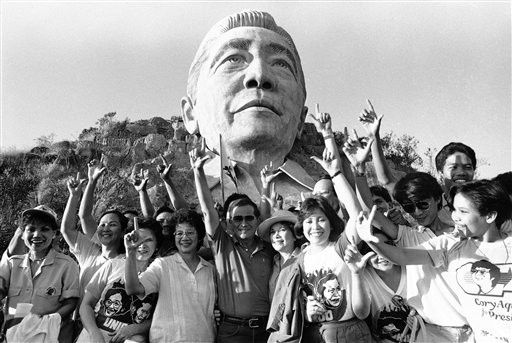Historian: Martial Law never about Aquinos, Marcoses

MANILA, Philippines — Martial Law was never about the Aquinos and Marcoses, a history professor said on Tuesday night as he warned that the Philippines faces a "war on memory" which he believed was more serious than the government’s war on drugs.
Jose Maria Tirol, a professor from Ateneo, cautioned Filipinos against thinking that martial law was about the battle of the Aquinos and the Marcoses for power.
Speaking at the relaunch of the Primitivo Mijares’ book “Conjugal Dictatorship,” Tirol said that Martial Law was actually about truth and lies.
“This is about truth and lies. This is the bottom line. This is about truth about memory and lies about memory. There is nothing ever in between,” the professor said.
He said that this dark period in history should not be reduced a simple dichotomy between two political colors or family.
Neither should you reduce martial law to a dichotomy. The mistake that is being done is it’s being reduced to dilawan vs this is not about Aquinos and Marcoses.
He said that as a country the Philippines has “national Alzheimer’s,” and this has allowed some sectors with their own interests to twist history especially the events during the dictatorship of Ferdinand Marcos.
“Even if you remember some, you will automatically remember it in a certain way. That is what’s happening today. Social memory is very malleable. Sometimes it can be twisted,” Tirol said. “If you look at our history gone or taught, it has been twisted many times. And never has it been twisted so much as what happened last year,” referring to the 2016 elections and the clandestine burial of Marcos at the Libingan ng mga Bayani.
“Social memory is very malleable, and what we have right now there are two wars in the country: one is the war on drugs and the bigger one actually the more long-term one is the war on memory. It is terrible war on memory,” Tirol said.
Tirol also called on the youth to refrain from treating Martial Law as an “insignificance” by referring to is a “thingy.”
He also emphasized the need for people to know the truth.
“History is about narrative an ongoing narrative an ongoing discourse. If you do not know the truth, you cannot discourse. If you do not know the truth, people up there who claim the truth will take over and win that discourse and what will happen to you? History is about our story,” the professor said.
Why 'move on'?
Maria Serena Diokno, former chairperson of the National Historical Commission of the Philippines (NHCP), criticized the government for saying that people should move on, saying such a view disregarded the importance of history in the present and the future.
She was referring to the statement of Ernesto Abella, the presidential spokesperson, who said: “It’s time to move on from just celebrating the past, remembering the past and to move on into the whole aspect of nation building, to give it a more positive outlook and… a more positive understanding.”
Malacañang announced several days ago that the 31st anniversary of the People Power Revolution would be “very simple and very quiet.”
Instead, Diokno said that we as a nation should squarely face its past.
“You want to move on? Harapin mo ang nangyari. Hindi mo yan tatalikuran. Harapin mo ng buong-buo. You cannot diminish it, you cannot ignore it, you cannot silence it,” said Diokno, daughter of human rights fighter and former Sen. Jose Diokno.
Diokno said that people insisting on moving on might be concealing something.
Diokno resigned as chairperson of NHCP after the government allowed the interment of the remains of dictator Ferdinand Marcos at the Libingan ng mga Bayani.
Following the decision of the Supreme Court stating that there was impediment to the burial of the late strongman, Marcos was clandestinely buried at the Libingan in November last year.
Passing on history
Rene Saguisag, a former senator, said that it was important for people to read books such as “Conjugal Dictatorship” for them to know what really transpired from 1972 to 1986.
“Sabi nga ni George Santayana, ‘A nation without memory is a nation of madmen.’ More popular of what he said, ‘Those who don’t remember the past are condemned to repeat it.’ We don’t want to have to go through that again,” Saguisag said.
He said that the youth of today had the responsibility to continue the fight they started during martial law.
“We have to pass on the torch to the younger ones. Kaya kayong mga kabataan we are passing the torch to you,” he said.
Joseph Christopher Mijares-Gurango, grandson of Primitivo Mijares, said that "Conjugal Dictatorship" could help the youth know what happened during martial law because of the insider accounts it offers.
"As an insider account, it’s the only one out there that of its kind. In it, he incriminates, he tells of a story. He was in a special position because of how much Marcos trusted him. He was also writing all of the lies," Gurango said.
- Latest
- Trending






























